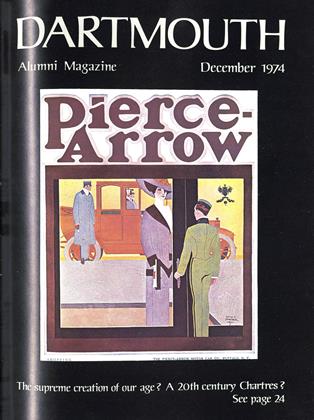Maybe they find the present so wearing that they don't want to know how it all came about. Maybe they figure that if they're going to have a future, they jolly well better learn about money and the way it flows. Maybe it's the cut of Professor X's hair or how their roommate's elder brother was turned on by Professor Y's lecture (or propelled into law school by his recommendation). Or maybe it's that most mysterious of primordial forces: student whim.
But, whatever the significance, preferences in majors do change - and sometimes change again in the opposite direction.
Statistically, without adjustment for the increasing numbers of students enrolled since the simultaneous advent two years ago of year-round operation and coeducation, History has lost 36 majors between the Classes of 1974 and 1976 (the first class with 25 per cent larger matriculation)while Economics has gained 30. Biology continues as a current favorite, probably reflecting the recent spurt toward Premeds: majors in '76 up numerically 22 over last year's graduating class and two over this year's seniors. Psychology, which very "in" for the Class of 1973, topping them all with 107 majors, dropped to fifth place with 65 members of 1974, moved up 12 current seniors, and has lapsed back to sixth favorite among the Class of 1976, with 53 members declaring. Ranking choices for this year's juniors are: Economics - 1st, 100; Biology - 2nd, 92; English - 3rd, 78; Government - 4th, 71; and History - 5th, 61.
A consoling note to those who fretted a few years back that the College might have to establish a Home Economics Department or expand extravagantly those fields of study assumed by men to be favored by women: Dartmouth alumnae and female juniors and seniors have demonstrated no discernible pattern in choice of major from their confreres - as most of the women on campus had been predicting all along.
 View Full Issue
View Full Issue
More From This Issue
-
 Feature
FeatureDartmouth De Gustibus: More Food for Thought
December 1974 By JOAN L. HIER -
 Feature
FeatureSheets of Sound
December 1974 By SID LEAVITT -
 Feature
FeatureChartres in a Chevrolet
December 1974 By ROBERT L. McGRATH -
 Feature
FeatureOur Crowd
December 1974 -
 Article
ArticleBig Green Teams
December 1974 -
 Class Notes
Class Notes1949
December 1974 By PAUL WOODBERRY, CHARLES S. KILNER








